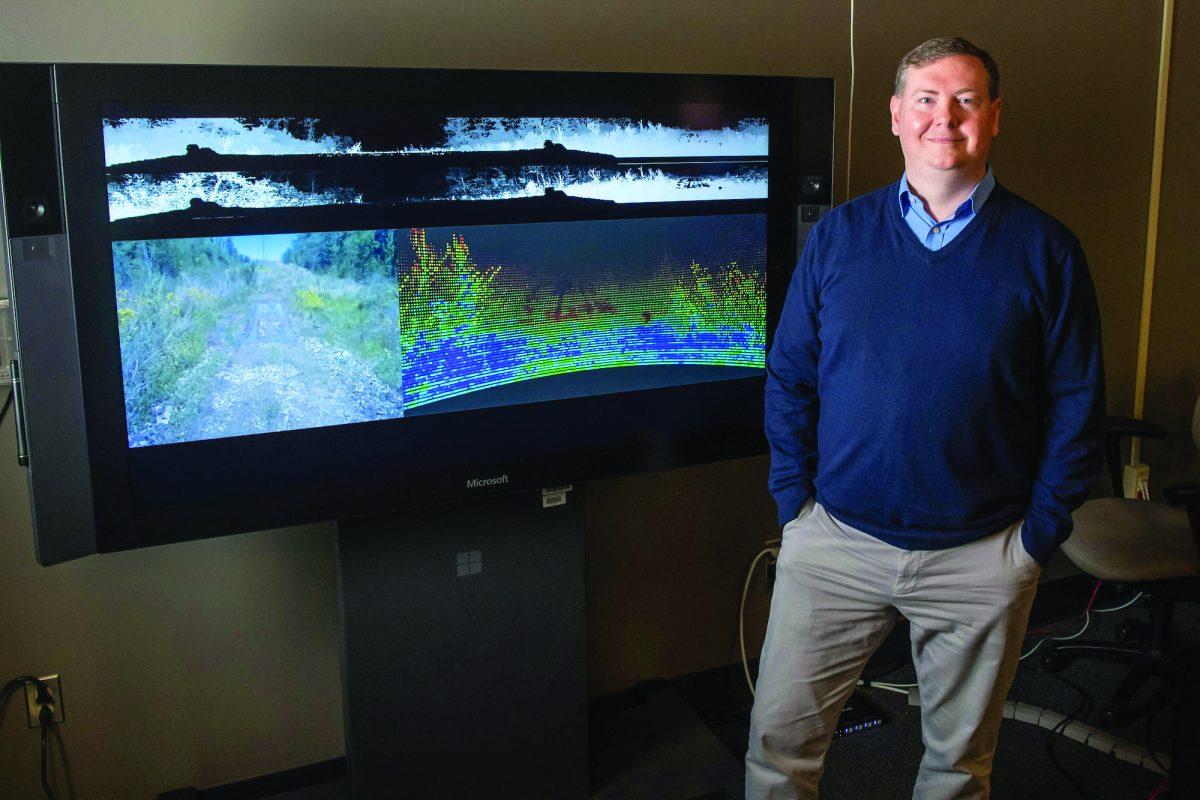Daniel Carruth, the associate director of Advanced Vehicle Systems at Mississippi State University’s Center for Advanced Vehicular Systems (CAVS), has recently joined a North Atlantic Treaty Organization research task group analyzing autonomous vehicle modeling and simulation.
Carruth will assume a leadership role within the task group, which is set to study the standards of modeling and simulation tools until 2023.
The ultimate goal of the NATO project is to improve the algorithms utilized by the military and researchers that allow autonomous vehicles to navigate unfamiliar, off-road terrain.
Despite the longevity of the research project, Carruth and the NATO team already have a schedule in place. Carruth gave a short synopsis of the next three years.
“In the next year, we plan to test a number of tools by comparing simulation results to data collected by members of the team,” Carruth said. “We will share data with tool developers and researchers to use to benchmark the software tools. Later, we will plan demonstrations of the capabilities of the modeling and simulation tools for the members of NATO.”
This is not the MSU professor’s first time working with NATO as he led two sub-groups for the organization last year. One fell along similar lines of his current project with a focus on benchmarking modeling and simulation tools, while the other involved virtual environments and sensors.
The modeling tools will be compared to real-world autonomous vehicle testing, allowing an accurate measure of their performance. In his latest NATO research group, Carruth will be comparing the performances of these modeling and simulation tools.
Clay Walden, the executive director of CAVS, believes Carruth’s work will influence the field for years to come.
“The work he’s doing with NATO will define the next generation of autonomous vehicles,” Walden said. “It helps us understand army technology roadmaps and where they’re heading. His work with NATO is critical to CAVS.”
At CAVS, Carruth leads the advanced vehicle systems research group which is developing and testing systems for self-driving vehicles in off-road environments.
CAVS recently received 50 acres from MSU to use for autonomous vehicle testing in numerous physical off-road environments. In support of the Army’s ground mobility research, the center was awarded over $3 million from the U.S. Army Engineer Research and Development Center.
Carruth’s research interests are in the use of modeling and simulation to study how autonomous systems will work in diverse conditions. One part of this research involves the study of how people interact with autonomous vehicles using virtual reality.
With this task group being his third time working with NATO, Carruth said he was eager for another learning experience.
“Working with NATO has been very exciting,” Carruth said. “I have been working with a large group of international researchers to understand the state of the art in modeling and simulation tools for autonomous mobility for military ground vehicles. The work is more about discussion and an exchange of ideas than hands-on research.”
The research task group meets almost every week via teleconference, and Carruth travels twice a year to a week-long international meeting.
Paramsothy Jayakumar, the co-chair of the NATO task group and United States Army Combat Capabilities Development Command Ground Vehicle Systems Center senior technical expert, described the significance of NATO’s ability to determine the performance quality and applicability of autonomous technologies in military contexts.
“It is critical to set up standard methods and tools for assessing military autonomous vehicles and be able to confirm their ability to fulfill strategic maneuvers and wider operations in a quantitative manner, especially since the military context provides extremely challenging and rough situations,” Jayakumar said in a press release.
Jayakumar said Carruth’s contributions will be integral to the long-term success of the task group.
“Given that this activity is likely to result in a long-lasting methodology and/or tool similar to the current NATO Reference Mobility Model (NRMM), which is widely used in military acquisitions by NATO member nations, such development will be a valuable investment for the future,” Jayakumar said. “The leadership and contributions provided by MSU’s Dr. Daniel Carruth are extremely critical to the success of the NATO Task Group.”
Carruth has lived in Starkville since 1995. He earned both his bachelor’s and Ph.D. from MSU, the latter of which he received in 2008. His plan was not always to remain in Starkville, but Carruth said he is glad he did.
“I didn’t intend to stay, but my wife and I love Starkville,” Carruth said. “Working at MSU and CAVS, I have access to world-class research capabilities and get to work with researchers around the world.”
MSU CAVS associate director advances vehicular autonomy with NATO
Logan Kirkland | Courtesy Photo
MSU’s Daniel Carruth was chosen to be a part of a NATO task force on vehicular autonomy.
0
Donate to The Reflector
Your donation will support the student journalists of Mississippi State University. Your contribution will allow us to purchase equipment and cover our annual website hosting costs.
More to Discover













